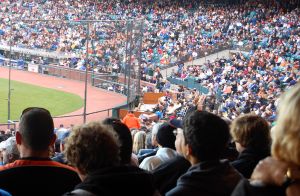Tragedy struck the sports world yet again this weekend, as another fan fell to his death while leaving a football stadium in California.
The man, whose name has not yet been released, fell on Sunday afternoon from the elevated Jamestown walkway that travels around Candlestick Park, where the San Francisco 49ers and Green Bay Packers were playing.
Off-duty paramedics and police offers tried to help the man, but the man had already passed. Initial eyewitness reports indicated that the man was intoxicated at the time of the incident, though investigators are still trying to determine what caused the man to fall.
 Fan safety has been a very important topic in professional sports, as fan injuries have become more and more prevalent at sports stadiums. Also this weekend, some rowdy fans from the University of Maryland were injured after a section of bleachers collapsed at Ludwig Field during a soccer match against Duke. Last month a 30-year old Atlanta Braves fan died during a baseball game at Turner Field when he fell nearly 70 feet from the upper viewing deck.
Fan safety has been a very important topic in professional sports, as fan injuries have become more and more prevalent at sports stadiums. Also this weekend, some rowdy fans from the University of Maryland were injured after a section of bleachers collapsed at Ludwig Field during a soccer match against Duke. Last month a 30-year old Atlanta Braves fan died during a baseball game at Turner Field when he fell nearly 70 feet from the upper viewing deck.
Premises Liability Cases
When incidents like this occur, the first questions people usually ask are “Why did this happen?” and “Who is responsible?” People are also concerned about how the incident could have been prevented and how future similar incidents could be prevented. Referring back to an earlier blog we posted about fan injuries in stadiums, there are several things that can explain the legal responsibility a stadium owner has to a fan that has been injured while at the vicinity.
Owners and managing companies of these large stadiums are fully aware of the types of risks posed to individuals who visit their establishments, and often tickets to sporting events or concerts are printed with a disclaimer and assumption of potential risk statement. These statements essentially mean that by purchasing the ticket, the guest understands the risk for injury and assumes responsibility should he or she be injured at the stadium. The statements also relieve the stadium’s owners or managers from assuming legal liability for the injured person.
Continue reading
 Boston Injury Lawyer Blog
Boston Injury Lawyer Blog


 Massachusetts is very clear about laws on underage drinking. Anyone under the age of 21 is not allowed to consume alcohol. Period. As a parent, it may be tempting to allow your underage son or daughter to have friends over for a party, especially during prom or graduation season, or if your son or daughter is home from college. Taking the keys and requiring guests to sleepover is not the way to prevent minors from getting hurt because of alcohol. Even if a minor injures him or herself without driving, you are still responsible for providing a place to consume alcohol, condoning its consumption, and supplying the beverages. Under Massachusetts General Laws, Chapter 138, Section 34, any person who supplies alcohol to a person under 21 is subject to a $2,000 fine and faces up to a year of imprisonment.
Massachusetts is very clear about laws on underage drinking. Anyone under the age of 21 is not allowed to consume alcohol. Period. As a parent, it may be tempting to allow your underage son or daughter to have friends over for a party, especially during prom or graduation season, or if your son or daughter is home from college. Taking the keys and requiring guests to sleepover is not the way to prevent minors from getting hurt because of alcohol. Even if a minor injures him or herself without driving, you are still responsible for providing a place to consume alcohol, condoning its consumption, and supplying the beverages. Under Massachusetts General Laws, Chapter 138, Section 34, any person who supplies alcohol to a person under 21 is subject to a $2,000 fine and faces up to a year of imprisonment. 






